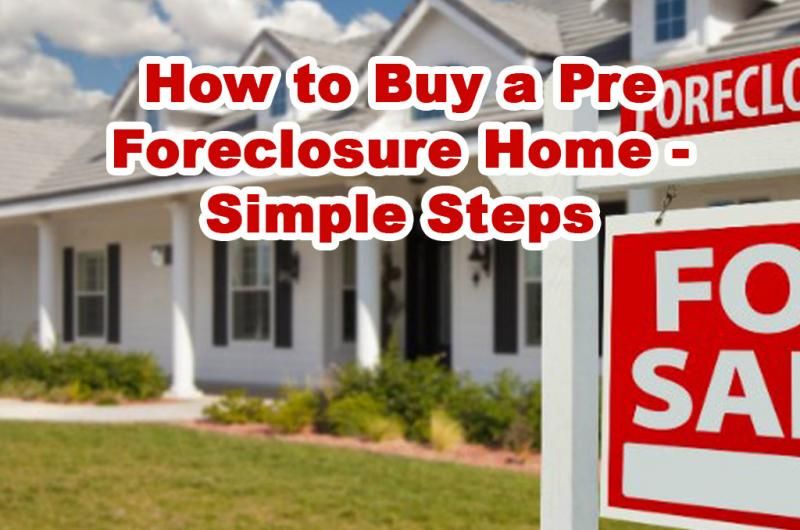Pre-foreclosure homes are very attractive to buyers and real estate investors for several reasons. Firstly, buyers covet a good deal, meaning that they will be able to save money as a result of buying the home below market value. Secondly, they also want to seize the chance of being the initial buyer to present an offer for a home, with no competition from other interested buyers. Generally, highly desirable homes often receive multiple offers from several interested buyers. While this is certainly possible, it is not quite realistic given the different rules, laws, and regulations on buying foreclosed homes from state to state.
What is Pre-Foreclosure?
When a homeowner fails to make monthly mortgage payments or defaults on their payments, their home ultimately becomes foreclosed. When this happens, the owner forfeits all rights to that property. The buyer has a specific number of days to bring the loan current no longer have a pre-foreclosure home. Unless the buyer can short sale the property, or pay off the outstanding debt, the property is subject to foreclosure and seized by the lender or bank, ultimately getting auctioned off at a foreclosure auction. While this is an unfortunate situation for the homeowner to be in, it also presents considerable opportunity for real estate investors.
Pre-foreclosure is the first step in the foreclosure process and investors can typically purchase pre-foreclosure homes at a discounted rate. Although the foreclosure process varies greatly by each state, homeowners who miss 3 consecutive payments generally receive a default notice, and the pre-foreclosure process will initiate. Investors can take advantage of this and negotiate a price with the homeowner
How to Buy Pre-Foreclosure Homes:
Find quality pre-foreclosure leads:
There are several ways to find pre-foreclosure leads that you can purchase at a discounted rate. Whether you look for leads in the local newspapers or obtain them from attorneys and wholesalers, the time and energy you invest in this process will determine the quality of those leads.
- Online Directories: Online directories provide foreclosure and pre-foreclosure listings as well as other information about the property such as the number of rooms, condition, interior photos and much more. There are free and paid online directories that contain these listings. The paid versions generally contain more up-to-date and allow you to search for listings by county. These online directories typically require the least amount of work, contain hundreds of pre-foreclosure and foreclosure leads, and allow you to work directly with a real estate agent who will guide you through the entire buying process. However, given the simplicity of online directories, there may be a significant amount of competition for the listed properties. Additionally, some of the information may be outdated or incorrect.
- Directly from Real Estate Agents: This method can be extremely helpful for people looking to purchase pre-foreclosed homes. This is because real estate agents have direct access to multiple listing service, which is only accessible to professional real estate agents. These agents will be able to precisely narrow down the search results, perform the research for you and fill out the paperwork. However, agents tend to list properties for a higher price to compensate for their commission.
- Public Records: This is a method that allows you to find pre-foreclosure homes for free. At your county recorder’s office, you can search in the public records section for “Notice of Sale”, “Notice of Default”, and “Los-Pendens”. During the foreclosure process, these notices are publicly recorded when they are issued to the homeowner. Although these records include the bank’s name, address, homeowner’s name, and the remaining loan balance, they will not include any photos or details about the property, nor do they include any other liens owed on the property. Additionally, sorting through all of the data is typically time-consuming, there tends to be less competition when obtaining leads through this method.
Find a Lender and Obtain a Pre-approval Letter:
After you get some quality leads and research the neighborhoods, it is time to find out what your maximum borrowing amount is, which will help you to set a budget. This pre-approval letter lets sellers know that you are serious and qualified. Furthermore, many real estate agents will refuse to work with you without having this pre-approval letter. You can obtain a loan through a hard-money lender, or a permanent loan through a bank. To get a pre-approval letter, you will need a copy of your credit report, identification, 2 years of tax returns, 2 most-recent pay stubs, and 2-3 months of bank statements.
Make an Offer and Get a Financing Commitment:
Once you get a pre-approval letter, it’s time to offer the seller, or their real estate agent a price, contingent on financing. Once your information and the property meet the lender’s underwriting requirements, the lender will require additional information before commitment. You will need to provide complete mortgage information, property details, purchase contract, property appraisal and documentation which shows where the funding is coming from.
After all of the paperwork has met the requirements and is approved, it is time to close the deal. This is where the property will be transferred into the new owner’s name, and where you will pay the closing costs. Some of these fees include lender fees, transfer taxes, property taxes, title insurance and some more. After this, you get the keys to the property, and it is officially yours.
